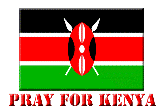Makau Mutua has always spoken his mind, and received lots of abuse as a result. He asks some thought provoking questions in his article on whether civil society will survive Uhuru's presidency.
Some quotes from the article below
"Let me clear one thing to set things straight. If there’s one
thing that’s sacred about an individual, it’s their conscience and
freedom of thought.
That, more than anything else, is what makes us
uniquely individual. It’s the single most important – and unarguable
foundation – of a democratic society.
That’s why constitutions – including Kenya’s –
protect the freedom of conscience and thought without qualification.
It’s a freedom that can’t be given, or taken away, by a state. Civil
society is the most reliable guardian of these freedoms. That because
the state is an untrustworthy protector of human rights.
This is the question – what’s civil society to do
if it feels so strongly about the Kenyatta regime? There’s no doubt Mr
Kenyatta and his government have the support of a lot of Kenyans. That’s
unarguable. But there are many Kenyans who are apathetic.
Take it from me – apathy is strongest in civil
society. It’s an “existential moment” for some of the leading lights of
civil society.
They feel betrayed by a population they’ve always
fought for. In fact, most of the freedoms Kenyans enjoy today were made
possible by civil society, including the 2010 Constitution.
Many are questioning the ability of the human
rights movement to uproot embedded tribalism and the money corruption of
the wealthy.
No one knows whether civil society will survive
the Kenyatta regime and, if so, in what shape. We are in uncharted
territory. But I can point to some possible routes. I believe Mr
Kenyatta understands that his regime suffers from a “legitimacy
deficit”.
That’s because of the charges against him at The
Hague and the contested nature of the election. He may try to co-opt
some civil society leaders into his regime to shore up his credibility.
There are signs that some important civil society
doyens are fighting to catch his eye. Yes – we have opportunists in
civil society too. Some of them have denounced principles they’ve long
held to prove their loyalty to Mr Kenyatta.
Secondly, others may accept the outcome of the election and
“move on,” as has been urged. This cohort would simply go back to the
trenches and continue their fight for human rights – much in the same
way they did under former President Kibaki.
Their job would be to “monitor” Mr Kenyatta’s
government, “hold it accountable,” and “protect” the gains in the 2010
Constitution. You can be sure there will be donor funding for such
“constructive engagement”.
These “true believers” are professional human
rights workers whose view of the world isn’t jaundiced. They know that
“engaging” the Kenyatta state and “dialoguing” with it can only further
legitimise it. But to them, this is the best of terrible options.
Thirdly, there is a group that’s likely to
disengage, and “divorce” the human rights movement. This chunk may
“resign” from civil society. A number may even “divorce” Kenya. Some may
go for further studies, or join the private sector. This group took Mr
Kenyatta’s election the hardest, and cannot reconcile itself to the
choice of a supposed plurality of Kenyans.
But others in this group will take a reflective
view and calibrate their future options. Many will be keenly watching
The Hague trials. That’s because a conviction of either Mr Kenyatta or
Deputy President William Ruto, or both, would be a game-changer. But
that’s a long way off, and the wait will be torturous and the outcome
uncertain.
Finally, it’s anyone’s guess how the Kenyatta
state will respond once civil society recovers from the shock of the
moment and reasserts itself




No comments:
Post a Comment